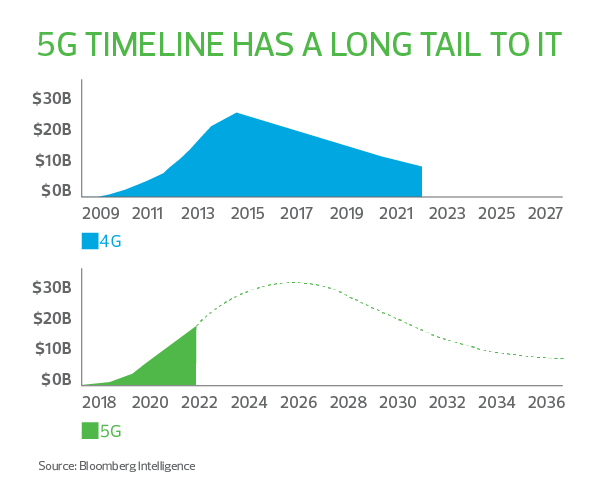The 5G job wave
5G is more complex than prior generations of wireless technology and will represent an opportunity for the services arms of telecom providers. With so many industries using automation, the telecom industry’s deployment and support of 5G over the coming decade is expected to add jobs on a global basis. To understand the impact of 5G on labor, it’s important to remember that 4G technology increased wireless-related jobs in the United States 84 percent over three years, according to The Wall Street Journal. As a result of the added complexities that come with the fifth generation of wireless technology, it’s anticipated that telecom jobs growth in the coming years will outpace previous generations. According to estimates, the entire 5G value chain could provide $3.5 trillion in overall economic benefits and support 22 million jobs.
Concerns about Huawei and other challenges
Yet, despite the clear opportunities for business growth and job increases amid the excitement about what 5G promises, it’s important to be aware of the global political saga that has played out between many countries and Huawei Technologies, the telecommunications equipment and consumer electronics manufacturer. The China-based company finds itself well-positioned to be a preferred provider to support the global rollout of 5G; many in the tech industry regard its products to be superior. Despite producing top-rated equipment, however, Huawei has been barred by an increasing number of countries, including the United States, due to allegations that the company is using its products for espionage. To guard against technology theft, telecom carriers like T-Mobile plan to work instead with Huawei’s rivals, including Nokia, Ericsson and Samsung. In a climate of urgency to be first to market with 5G, something the Trump administration has advocated for U.S. companies, it is important for businesses to be mindful of security challenges and other risks in the race to launch.
In addition to challenges involving technology security and partnering with trusted telecoms, 5G poses other risks including concerns over new regulatory compliance for companies to address, capital and resource demands to build supporting infrastructure, as well as growing concerns on whether skilled workers will be ready for 5G specialized demands. As mentioned earlier, 5G could mean millions of new jobs, but will employees be ready for this job wave with the enhanced skills needed to tackle 5G’s new frontier and complexities?
Preparing for 5G
What should telecom and technology companies do now to prepare for 5G opportunities? The technology certainly provides avenues for company growth, but some careful initial groundwork is needed to understand fully how 5G can advance business development initiatives. For starters, consider the following questions to get you on the 5G trac:
- Do you have access to the 5G network, and if not, when will 5G be rolled out in your location(s) of business?
- How will 5G affect your business’s existing telecom and technology services? Faster interactions, improved experiences, efficient management of the internet of things?
- Does your business have developing services currently that would be improved by 5G? How can you integrate that technology into your innovation efforts?
- Are you prepared for the additional infrastructure costs resulting from the 5G launch? Can you offset these costs with efficiencies and cost savings in other areas of the business?
- How will you train current employees and recruit new talent needed to address new 5G opportunities?
- Do you require a provider to assist you with 5G rollout? What is your process in identifying a trusted provider and carrie
- Have you assessed your current security and privacy practices and determined how 5G will affect these practices?



